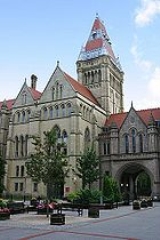
satire A Clockwork Orange
is Burgess's most famous novel, though he dismissed it as one of his lesser works. It was adapted into a highly controversial 1971 film
by Stanley Kubrick
, which Burgess said was chiefly responsible for the popularity of the book. Burgess produced numerous other novels, including the Enderby quartet, and Earthly Powers
.
Nabby Adams, supine on the bed, grunted. It was four o’clock in the morning and he did not want to be talking. He had had a confused coloured dream about Bombay, shot with sharp pangs of unpaid bills. Over it all had brooded thirst, thirst for a warmish bottle of Tiger beer. Or Anchor. Or Carlsberg. He said, 'Did you bring any beer back with you?'
![]()
Vorpal had the trick of adding a Malay enclitic to his utterances. This also had power to irritate, especially in the mornings. It irritated Nabby Adams that this should irritate him, but somewhere at the back of his brain was the contempt of the man learned in languages for the silly show-off, jingling the small change of ‘wallah’ and charpoy...
![]()
‘What you could do with is a nice strong cup of tea, sir. I’ll tell the kuki to make you one.’ ‘Does it really do any good, Nabby? (That was better.) ‘I’ve tried every damn thing.’....
![]()
His heart beating faster, his throat drying, Nabby whispered to the driver, ‘Not so bloody fast.’ ‘Tuan?’ ‘All right, all right.’ One of these days he must really get down to the language. There never seemed to be the time, somehow....
![]()
Relief brought an aching desire to be sitting in a kedai with a large bottle of Tiger or Anchor or Carlsberg in front of him....
![]()
Sultan Aladdin… had few illusions about his own people: amiable, well-favoured, courteous, they loved rest better than industry… their function was to remind the toiling Chinese, Indians and British of the ultimate vanity of labour.
![]()
…it was a cardinal rule in the East not to show one’s true feelings.
![]()

